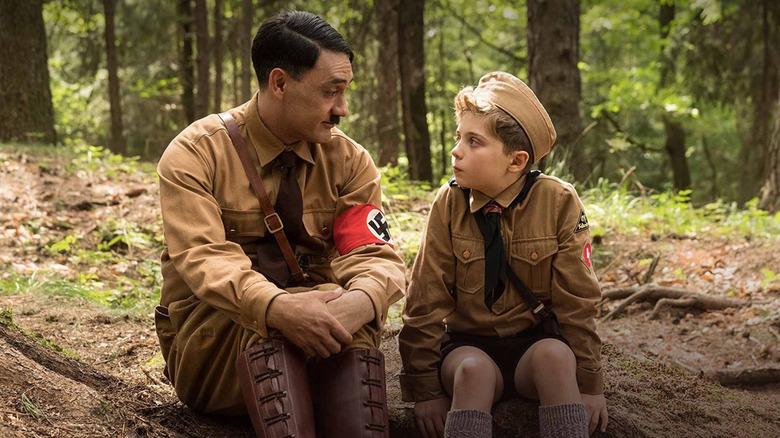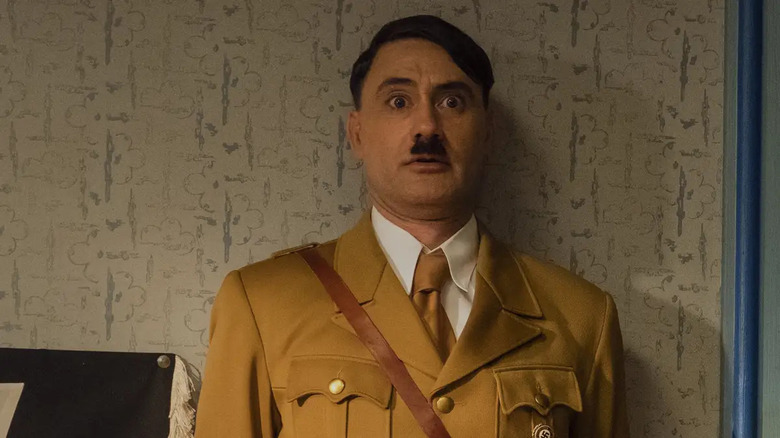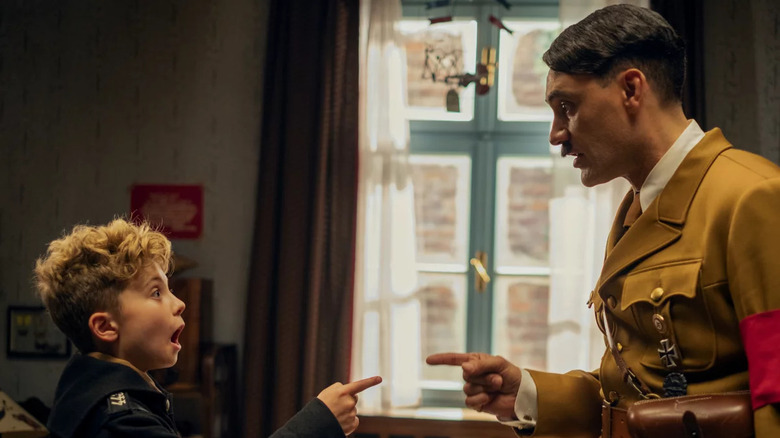Taika Waititi Wasn't Given A Choice When It Came To His Jojo Rabbit Role
After the massive success that was "Thor: Ragnarok," it may have been surprising to some when director Taika Waititi decided to work on a smaller-scale dark comedy about a wannabe Nazi kid in World War II era Germany. "Jojo Rabbit" follows a young boy named Jojo (Roman Griffin Davis) who idolizes Hitler and fully buys in to the anti-semitic tropes they're teaching him at his Hitler Youth camp.
While the intention of "Jojo Rabbit" was to portray how radicalization can warp a person's mind and allow them to see a fascist, hateful society as normal and even admirable, the movie's satirical depiction of Nazis as hapless buffoons, especially in the first half of the film before Jojo starts to break free of the Nazis' mental conditioning, didn't work for a lot of people. To some, the depiction of Hitler as a toothless, goofy figure just felt kind of tasteless.
Played by Taika Waititi himself, the "Jojo Rabbit" version of Hitler is actually a figment of Jojo's imagination, and it is almost completely divorced from the way the actual Hitler acted. While I (and plenty of other critics) would argue that "Jojo Rabbit" did a great job balancing the dark and comedic tones of the film, it's easy to see why Waititi would be a little hesitant to attach his face to the character.
Unfortunately, one of the studio's demands for funding the movie was that Waititi would have to be the one playing Hitler. He'd be tasked with portraying one of the most despised people in world history in a way that mostly felt light-hearted. "I just didn't want to have myself get clouded with negative shit while trying to play someone so evil," he told The Hollywood Reporter, "But my ego is so massive, it was bound to happen."
'F*** off, Hitler!'
What serves as the clearest condemnation of the Nazis is Jojo's declining relationship with his imaginary friend Hitler. Hitler becomes increasingly less friendly to Jojo as he learns to care for the Jewish girl Elsa (Thomasin McKenzie) hiding in his house, culminating in Hitler's final appearance where he has a bullet hole in his head and is no longer acting goofy or friendly at all. Hitler tries to convince him to betray her, but Jojo yells, "F*** off, Hitler," and kicks him out a window.
Asking people to laugh during a movie about Nazis is a big ask, which is why it's good that the movie isn't fully a comedy. The best moments of the movie are the bits we get of Jojo's mother (Scarlett Johansson) as she tries to resist the Nazis and grapple with the fact that her son has become a bigoted monster, or the signs that Captain Klenzendorf (Sam Rockwell) is aware of the evils he's taking part in and doesn't feel good about it, but still feels forced to go through with them anyway. Although the film never redeems Klenzendorf or lets him off the hook for his complicity, he does manage to sneak in a few good deeds that reaffirm his humanity. The comedy of "Jojo Rabbit" is a thin veneer over the horror these characters are surrounded by, and the movie's at its best when it suddenly pulls that veneer away.
The choice to make Hitler funny
When asked how much research went into his performance as the infamous dictator, Waititi responded, "I didn't base him on anything I'd seen about Hitler before. I just made him a version of myself that happened to have a bad haircut and a sh**ty little mustache. And a mediocre German accent." He added that he didn't think people would've enjoyed a version of this movie where he tried to do a realistic impression of the man, saying, "He was such a f***ing c**t, and everyone knows that."
Basically, this is a movie that trusts its audience to already understand that Hitler was bad, and so were the rest of the Nazis. Its interest is not in making the case that what the Nazis did were evil but exploring how a normal person could be sucked into that evil. By not even attempting to do an actual impression of Hitler, the movie directs the blame for Jojo's radicalization on the German government and the larger culture of the time, which largely worked on Hitler's behalf and enabled his rise to power. By not dwelling on the specifics of the real Hitler, "Jojo Rabbit" works as a movie that critiques bigotry and fascism in general, rather than this one specific time and place.
As a Jewish person himself, Waititi also considered the comedic irony of the renowned anti-semite being played by someone like him. When asked why he was willing to play Hitler, he explained, "The answer is simple: what better f*** you to that guy?"


